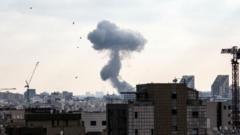In a scathing critique of U.S. actions, China has asserted that strikes on Iran’s nuclear facilities not only harm Iran but also damage the credibility of the United States in international negotiations. Fu Cong, China’s ambassador to the United Nations, condemned the attacks, claiming they escalate violence and contribute to instability in the Middle East. This sentiment was echoed in state media, which highlighted Beijing’s long-standing role as a supporter of Tehran amidst a backdrop of geopolitical tensions.
China Criticizes U.S. Actions in Iran, Claims Damage to Global Standing

China Criticizes U.S. Actions in Iran, Claims Damage to Global Standing
In a recent address, China’s U.N. ambassador stated that the U.S. has undermined its international credibility following military actions against Iran, highlighting the complex dynamics of global diplomacy.
China's response comes in the wake of heightened military actions that disrupt ongoing diplomatic dialogues with Iran. The country is drafting a U.N. resolution alongside Russia and Pakistan advocating for a ceasefire and civilian protection. Meanwhile, analysts note Beijing's complex relationship with Tehran, as China has been a significant economic ally, securing oil resources vital for its energy needs. Observers now query how China will navigate its support for Iran while managing regional and global pressures regarding maritime security, particularly concerning the strategically critical Strait of Hormuz.
As the situation continues to evolve, analysts emphasize the importance of diplomatic engagement to alleviate tensions in the region, with calls for cooperation while recognizing the intricacies of international relations shaped by national interests.
David Pierson covers Chinese foreign policy and economic relations, bringing over two decades of journalism experience.
As the situation continues to evolve, analysts emphasize the importance of diplomatic engagement to alleviate tensions in the region, with calls for cooperation while recognizing the intricacies of international relations shaped by national interests.
David Pierson covers Chinese foreign policy and economic relations, bringing over two decades of journalism experience.





















